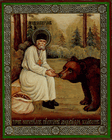St. Michael and All Angels
Today we recognise the heavenly hosts. Our Greek brothers and sisters refer to them
as the bodiless powers, recognising that angels are essentially spiritual
beings. Now just, what are angels? The Greek word, Angel means messenger. Angels and Archangels basically then are
messengers sent by God. It is reckoned
by theologians that only Angels and Archangels have anything to do with
men. The other classes are angels in
ascending order are: Principalities, Powers,
Virtues, Dominions, Thrones, Cherubim and Seraphim. It is not clear to us the purposes of these
various classes of spiritual beings, but we know that they serve God, and the
last two, cherubim and seraphim are reckoned as angels of the presence, that is
that they are in the highest heaven with the Lord.
Biblically, there are several
manifestations of angels. First, we hear
of the Angel of the Lord, which for the most part is not reckoned to be an
angel, but to be the Lord YHWH himself.
Next we run into St Michael, the Archangel
who is described in Daniel and Revelations.
He is counted as the special angel who is in charge of Israel, and who
casts Satan out of heaven. St. Raphael is mentioned in the book of Tobit
and accompanies Tobias on his adventures.
St. Gabriel is mentioned in the New
Testament, and he is the Angel who announces the birth of Jesus. Uriel is
mentioned in IV Esdras. Other angels are not mentioned by name. The Seraphim are described by Isaiah in his
vision. The Cherubim are described by Ezequiel
in his vision. Thrones are mentioned in
Colossians, Dominions in Colossians, Virtues in I Peter, Powers in Colossians,
and Principalities in Colossians. It should be mentioned that for most classes
of angels, there are corresponding classes of demons. When Satan was cast out of heaven one third
of the angels followed him. Therefore
angles, spiritual thought they may be, are like us, capable of choosing between
right and wrong.
This day we remember especially St. Michael
and the other angels who minister to us, and to those in heaven who give us the
example of constantly praising Godl
Please go to the reference above and look
at the 71 versions of St. Michael, truly fascinating.
Collect: Dear Lord, as you created a vast order of angelic hosts to
worship you and do your will, grant that we too like your angels in heavens
would worship you and do your will. This
we ask in the name of our blessed Yeshuah who is higher than the angels. Amen.
Lessons:
Isaiah 6:1-3
Hebrew 1:7-14
Mark 13:21-27
Psalm 14








